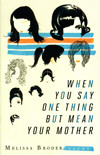When You Say One Thing But Mean Your Mother
Melissa Broder’s When You Say One Thing But Mean Your Mother is a collection of narrative portraits, most of them less than flattering. The speaker in this collection is nothing if not critical. Of the woman with suburban ideals, who “should be left to rot in her / dream car with a frozen Jenny Craig / glazed salmon.” Of an aging camp counselor, a “hippie phenomenon / but she is more crow’s feet than feathers.” Of middle-aged men wearing unhip t-shirts, “age 35, attempt / one last punch at design-y-ness.”
Melissa Broder’s When You Say One Thing But Mean Your Mother is a collection of narrative portraits, most of them less than flattering. The speaker in this collection is nothing if not critical. Of the woman with suburban ideals, who “should be left to rot in her / dream car with a frozen Jenny Craig / glazed salmon.” Of an aging camp counselor, a “hippie phenomenon / but she is more crow’s feet than feathers.” Of middle-aged men wearing unhip t-shirts, “age 35, attempt / one last punch at design-y-ness.”
Broder’s best moments come, not surprisingly, when the speaker turns this critical eye upon herself, when she includes herself among the condemned, as in “Round the Bend.” “It’s safe on this side to talk about crazy / like a war going on in some other country. // At home each of us brushes against it. / Jon takes blue pills. I’ve got grey and pink.” Here, the speaker recognizes her tendency to criticize without always stepping back to consider her own flaws. And “Where Is Your Vampire” illumines the hatred pointed out at the world as fueled by the residue of an adolescent self-hatred:
In gym I scrape my knee but tear
nothing, a fresh blood bruise pooling
under wool stockings
like hickeys. A thought precedes
the wretched feeling: Send me
somebody undead to bless
this walrus body. On the bus
I stab a five-pointed star
into my arm with Bic ink
and a sewing needle. Doesn’t
take.
In poems like “We Will Find Ourselves Hating a Blonde Stranger,” the speaker of these poems hates not a blonde at all, but her own Jewishness and her upper-middle class background:
What is expected of us but to stay sane?
Plenty of things. Abstain from honey-baked ham,
Nantucket, seersucker, Volkswagen.
Bloody Marys, Laura Ashley, turning
the other cheek and the non-Ivy League.
Yet, many of the poems here seem to be self-consciously compensating for this well-to-do background. “The Cost of Acquiring a Franchise Man” imagines an ambitious young woman faking orgasms for the meth-producing manager of a fast food chain. “Just Like Teach for America” chooses as its target a filmmaker who attempts to understand the urban experience through submersion and ends up being forced into fellatio by a junkie named Lurch. While these poems add a certain grit to the collection, it is a superficial one at best, a classist one at worst.
Another unfortunate possibility of these poems is that they reinforce consumerism, both through form and content. The poems are shaped as imagistic narrative lyrics. This form is immediately consumable; the pop song of poetry. Also, the characters here are defined by what they buy: Starbucks, IKEA, Robitussin, Aqua Net (twice), Sony and Oakley are just a few of the brand names used in the course of characterizing her subjects.
While one can imagine these brands are named in an attempt to lampoon our contemporary symbolic system—our attempts to be a certain kind of people by buying certain products—what these characterizations accomplish is the opposite of that goal. An adulterer is superficial for owning a Sony Hi-Def television. A fast food manager is lower class for having a bowl cut from Hair Barn. This speaker reinforces our brand-name values while claiming a bird’s eye vantage of culture, more aware than the subjects she chooses to critique that they are what they buy.
The titles in this collection say a lot. There are poems that provide an incisive critique of some of our baser impulses (i.e. “Your Mother Is Dying and I Want Details”) but they are overwhelmed by superficial musings (i.e. “Adult Onset Acne”), petty missives (“Dear Aging Anarchist”) and judgmental observations of consumer culture that end up commenting as strongly on the speaker as the subject (“Is it Organic?”). The title of the collection itself reveals a certain presumption, that the speaker knows what you mean better than you do. Had this collection been titled, When I Say One Thing But Mean My Mother it might have been on the path to being more revealing of human nature.





